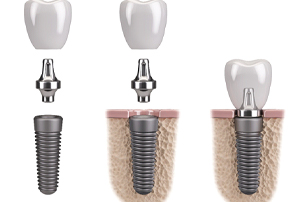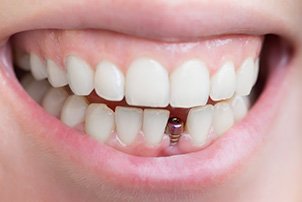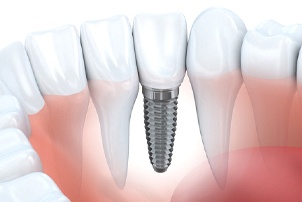Dental Implants – Centerville, OH
Enjoy a Strong, Healthy Smile Again
When you lose a tooth, you experience more than just an unsightly gap in your smile. Your remaining teeth can wander out of position, causing problems with your bite and jaw joint, and your jaw bone can atrophy, making your facial shape change and appear older. Out of all the replacement options, only one addresses all of these negative outcomes of tooth loss—dental implants.
This strong, beautiful alternative to bridges, partials, or full dentures will improve your smile and your lifestyle. They look, feel, and function like natural teeth because of a titanium anchor attached to the jawbone.
The 4-Step Dental Implant Process

Dental implants have a complex treatment process, so getting them takes several months. Still, you can rest easy – the posts’ many benefits are worth the time and effort! Our practice works with local experts to ensure your implants are well-placed, giving you the best results possible. That means you’ll benefit from skilled oral surgeons and their years of experience. As for overall care, you’ll undergo four phases: consultation, surgery, osseointegration, and delivery of the final restoration.
Initial Dental Implant Consultation

Before anything else, you’ll meet Dr. Passidomo for a brief consultation. This session lets us learn your treatment goals, as well as your oral health background and other vital factors. Based on its results, we’ll confirm whether dental implants suit you and adjust your final treatment plan.
Even if we decide you don’t qualify for dental implants, you needn’t panic. You can become a good candidate later through extra dental work – gum disease treatment, tooth extractions, etc. Those procedures would make your mouth healthy and strong enough for implant posts.
Dental Implant Surgery

As stated earlier, we work with local experts for dental implant surgery. These skilled oral surgeons will place your implant(s) precisely using advanced methods and tools. Given that fact, you can expect results that look good, feel good, and enhance your oral health!
The implant surgery itself should involve several key steps. First, the surgeons will numb the treatment site to prevent aches during their work. They’ll then make a small incision in your gums to create room for the final dental implant. From there, the surgeon and their team will precisely place the implant before suturing your gums shut. They’ll conclude by putting a protective cap over the now-set post.
Dental Implant Osseointegration & Abutment

Following the surgery, your dental implant will fuse with your jaw. This process – sometimes called osseointegration – takes 4-6 months and secures your implant post. Once it’s done, your new “tooth” will remain highly stable and become a permanent part of your mouth.
You’ll undergo a follow-up surgery once you’ve healed from implant fusion. At that point, we’ll place an abutment (i.e., a metal connector) on your implant that secures the restoration. A dental lab will craft the final prosthetic while you recover from this secondary work.
Delivery of Dental Implant Restoration(s)

Dr. Passidomo will deliver your final restoration at the end of your implant treatment. In other words, he’ll place a dental prosthetic that “matches up” with how many teeth you’ve lost. Depending on the exact number, this device could be a dental crown, dental bridge, or implant denture.
It shouldn’t take long to fit your final restoration; we’ll just apply some dental cement. Our team will then make any needed last-minute changes to ensure quality results. When we’re done, you’ll be free to go out and enjoy your restored smile!
Benefits of Dental Implants

By imitating an entire natural tooth, from the root up, dental implants are a tooth replacement option that closely mimics nature. The result? The jaw bone remains stimulated, keeping it strong and healthy, which enhances your appearance, especially as you get older. Dental implant patients also enjoy restored tooth function, allowing for a healthy diet of hard-to-chew foods. Speech may also improve because you don’t have to worry about your replacement teeth slipping or coming loose. Strong and secure, your new smile will boost your confidence and improve your quality of life.
On top of all the health benefits, dental implants are highly successful. In fact about 95 percent of dental implants are still successful even 10 years after they were originally placed. Plus, with the proper care, dental implants can last for more than 30 years!
Who Dental Implants Can Help

Regardless of how many teeth you’ve lost, there is an implant solution that can meet your needs. Dr. Passidomo can evaluate your mouth and help you create a treatment plan to bring your smile back to full strength and health. Here are some of the ways that dental implants can help people with multiple different stages of tooth loss.
Who Is a Good Candidate for Dental Implants?

Most adults in good health can get dental implants without issue. Here are the important criteria we look at to determine who is a good candidate for dental implants:
- Overall Health: Placing dental implants requires a surgical procedure, so you need to be in good enough health to undergo the minor surgery.
- Oral Health: Cavities and gum disease increase your risk of dental implant failure. If you have any existing oral health issues, they need to be addressed before you can get implants.
- Jawbone Density: You must have an adequate enough jawbone to successfully support dental implants.
If you aren’t a good candidate for dental implants now, this doesn’t completely rule them out. Many patients need to have preliminary procedures completed beforehand, including tooth extractions, gum disease treatment, or bone grafting. We are more than happy to help you get these procedures scheduled so you can work towards getting dental implants in the future.
Missing One Tooth

To replace one missing tooth, a single dental crown is affixed to one dental implant without having to rely on the surrounding healthy teeth for support—unlike a dental bridge. The crown is color-matched to fit in perfectly with your surrounding teeth. No one will be able to tell the difference between your replacement tooth and natural teeth!
Missing Multiple Teeth

Three or more consecutive missing teeth can utilize two dental implants to secure a bridge. Dental implants can also be used to support a partial denture if you are missing multiple teeth in different locations of an arch.
Missing All Teeth

Even if you’ve lost all your teeth, dental implants can help. Through four to six strategically placed implants, your full dentures can be firmly set in place and give you a fully functional smile once again.
Understanding the Cost of Dental Implants

The cost of dental implant treatment can vary case by case. It depends on many factors, such as how many implants you need, what kind of restoration will be attached, and the location of the implants in your mouth. During a consultation with Dr. Passidomo, you can discuss your specific situation and go through the price of for your customized treatment.
Because of the process of replacing teeth with dental implants, the upfront cost of this option is higher than that of dental bridges or dentures. However, when you include the cost of having to frequently replace these other options over the years, dental implants can turn out to be the smartest financial decision in the long run.
Interested in learning more? Contact our team in Centerville for a consultation today!
Dental Implant FAQs
Am I too old for dental implants?
Age isn’t necessarily a defining factor for your candidacy for dental implants. As long as a patient has finished growing, they can replace their missing teeth with dental implants if they meet the other criteria, like having good oral and general health.
Can I get dental implants if I have gum disease?
Despite being preventable, gum disease is still the leading cause of tooth loss. If you’ve lost teeth to the infection, you won’t be a candidate for dental implants if it’s still active. Instead, you’ll need to undergo periodontal therapy to fight the infection to ensure you have a healthy foundation for your new smile
Will I need bone grafting?
Often, patients interested in dental implants will need bone grafting, but it isn’t always necessary. A CT scan of your jaw is used to assess the density of your bone. If it reveals areas that are weakened, you’ll need bone grafting before your placement surgery to ensure your jaw can support the posts long-term.
Can dental implants fail?
Dental implants are the most reliable solution to treat tooth loss because they provide predictable results. They have over a 95% success rate and are proven to last for decades with the right care. Although they are known for their durability, they can fail. The risk of implant failure is less than 5%. It’s often caused by a preventable infection. You can help to ensure your new smile thrives by maintaining your oral hygiene at home and visiting your dentist at least twice a year for a cleaning and checkup. If you develop any concerning symptoms, like a feeling the implant is loose, pain, or tenderness, don’t wait to contact your dentist.
Do dental implants hurt?
Your oral surgeon will use sedation or anesthesia during your placement surgery to keep you comfortable. You won’t feel any pain; however, there will be some discomfort while you heal. It’s best to use an over-the-counter pain reliever for the first few days following your placement surgery to manage your discomfort. After you’ve healed, you shouldn’t have any pain.
Can I use my dental insurance?
Every policy is different, but many dental insurances will cover a portion of the cost of your treatment after paying your deductible. A member of our team will work on your behalf with the insurance carrier to file the necessary claim forms to reduce your out-of-pocket expense. We’ll explain your payment options for any remaining balance to keep your new smile affordable.










